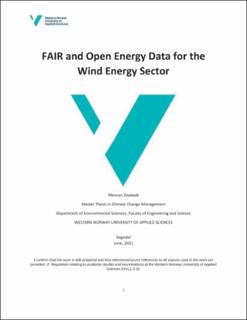| dc.description.abstract | The future of the planet depends on how we produce energy. A reliable, affordable, sustainable, and decarbonized energy system is vital for the energy sector. Clean energy development is essential for tackling climate change and mitigate its worst consequences. Transitioning to an energy system based on renewable technologies will have significant environmental and economic benefits worldwide. Wind energy is one of the most important sources of clean and renewable energy. The development of this industry will increase its contribution to the global energy supply chain and thus mitigate climate change. Increases in energy production technically increase greenhouse gas (GHG) emissions only if renewable energies replace fossil fuels, leading to lower GHG emissions.
Data sharing and data governance enable humans and machines to interact and collaborate more efficiently, enabling the deployment of Artificial Intelligence-supported smart energy systems. For example, improved data access and collaboration in the wind energy sector will help better predict wind energy and improve the integration of this intermittent energy source into the electricity grid. FAIR data refers to a database that meets principles of Findability, Accessibility, Interoperability, and Reusability. FAIR and open data are seen as a way forward to ensure data sharing in the wind energy sector. Consequently, this thesis evaluates the state of FAIR and opens data in the wind industry. 47 databases were evaluated using a manual and an automatic assessment method. Manual assessment is done by the ‘self-FAIR assessment tool’ developed by the Australian Research Data Common (ARDC). The automatic assessment is done by ‘The FAIR Maturity Evaluation Service’ developed by Mark D Wilkinson. Findings show that FAIR principles are not well implemented in the wind industry. Of the assessed databases, only 28% comply with FAIR principles based on automatic assessment, and 45% based on manual assessment. Furthermore, only 30% of the databases are open.
The thesis concludes with identifying barriers and recommendations to improve the overall score for
FAIRness. | en_US |

